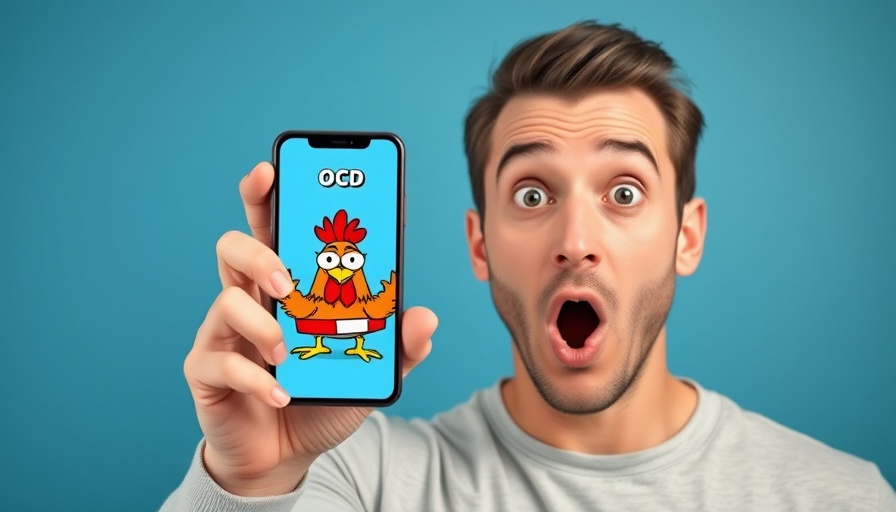
A Lighthearted Look at OCD Through Memes
In a recent video titled Therapist Reacts To FUN OCD Memes, Nathan Peterson, an OCD and anxiety specialist, skillfully blends humor and education as he analyzes popular memes related to obsessive-compulsive disorder (OCD) and anxiety. While these memes provide a comedic lens through which to examine the often misunderstood and stigmatized world of OCD, Peterson highlights the deeper psychological insights intertwined in the humor.
In Therapist Reacts To FUN OCD Memes, the discussion dives into the intersection of humor and anxiety disorders, prompting deeper analysis on the insights shared.
The Quirky Nature of Our Thoughts
OCD often leads individuals to grapple with bizarre and intrusive thoughts, and Peterson addresses this phenomenon head-on. He humorously illustrates how the brain, instead of allowing rest at nighttime, seems to enter 'problem-solving mode' with random, often unhelpful thoughts. For example, why is it that when we try to sleep, our minds race through potentially irrelevant questions like, “Where’s my birth certificate?” This pattern isn’t merely entertaining—it's a relatable struggle many face, and it reflects the relentless nature of OCD and anxiety. Peterson encourages us to recognize that these thoughts are not a reflection of our worth or our ability to cope, but rather a product of our anxious minds.
Understanding Intrusive Thoughts
Peterson also discusses the common fear that one's intrusive thoughts might 'infect' someone else with new obsessions. This fear, while real to those living with OCD, is often unfounded. He reassures viewers that obsessions are not contagious, reinforcing the idea that individual experiences are tied not only to our thoughts but to what we value and care about deeply. Psychoeducation in this light is essential; it can empower those affected to share their experiences without the fear of recursively transmitting their anxiety to others.
The Meaning Behind Compulsions
Another poignant moment occurs when Peterson reflects on the compulsive behaviors many engage in to alleviate anxiety. He illustrates that while such actions may provide temporary relief, they can perpetuate anxiety in the long run. Peterson offers a critical perspective: rather than shaking off intrusive thoughts or seeking reassurance to stave off fears, individuals should learn to coexist with their thoughts without giving them undue power. This resonance with CBT (Cognitive Behavioral Therapy) principles emphasizes facing fears instead of avoiding them.
What We Really Mean by OCD
One striking point Peterson makes is about the misconceptions surrounding OCD. Many people conflate liking order and tidiness with having OCD, which can be frustrating for those who truly suffer from the disorder. Peterson articulately conveys that true OCD is not about being neat; it’s about thoughts that cause significant distress and compulsions that often follow. By demystifying these differences, it fosters a better understanding of the disorder and highlights the need for compassion and awareness.
Prescription for Humor in Mental Health
While the discussion covers serious themes surrounding anxiety disorders, the humor derived from the memes serves as a reminder of the importance of laughter in mental health. Peterson encourages viewers to embrace their humor as a coping mechanism, driving home the idea that even amid distress, levity can offer moments of relief. This juxtaposition of humor and responsibility provides a multifaceted lens for understanding OCD that resonates with many while also expanding on key therapeutic principles.
Practical Insights for Managing Anxiety
For those navigating the complexities of OCD and anxiety, Peterson leaves them with valuable advice: work towards acceptance rather than seeking assurances. Embracing uncertainty can lead to reduced anxiety about the things we cannot control, and practicing self-compassion nurtures resilience against their inner critic. Practical techniques such as mindfulness, grounding exercises, and exploring self-help strategies can further bolster one's mental health journey.
Conclusion: Embrace Your Journey
This insightful video taps into the collective experiences of those dealing with OCD and anxiety, while weaving in lightheartedness through meme culture. For professionals in the mental health field, understanding the nuances of OCD—even when presented through the lens of humor—can enhance empathy and support for those who are navigating their own struggles. To keep learning about mental health, seek outlets like this one where understanding and compassion are at the forefront. Let’s continue to spread awareness, break stigma, and laugh together.
 Add Row
Add Row  Add
Add 




Write A Comment